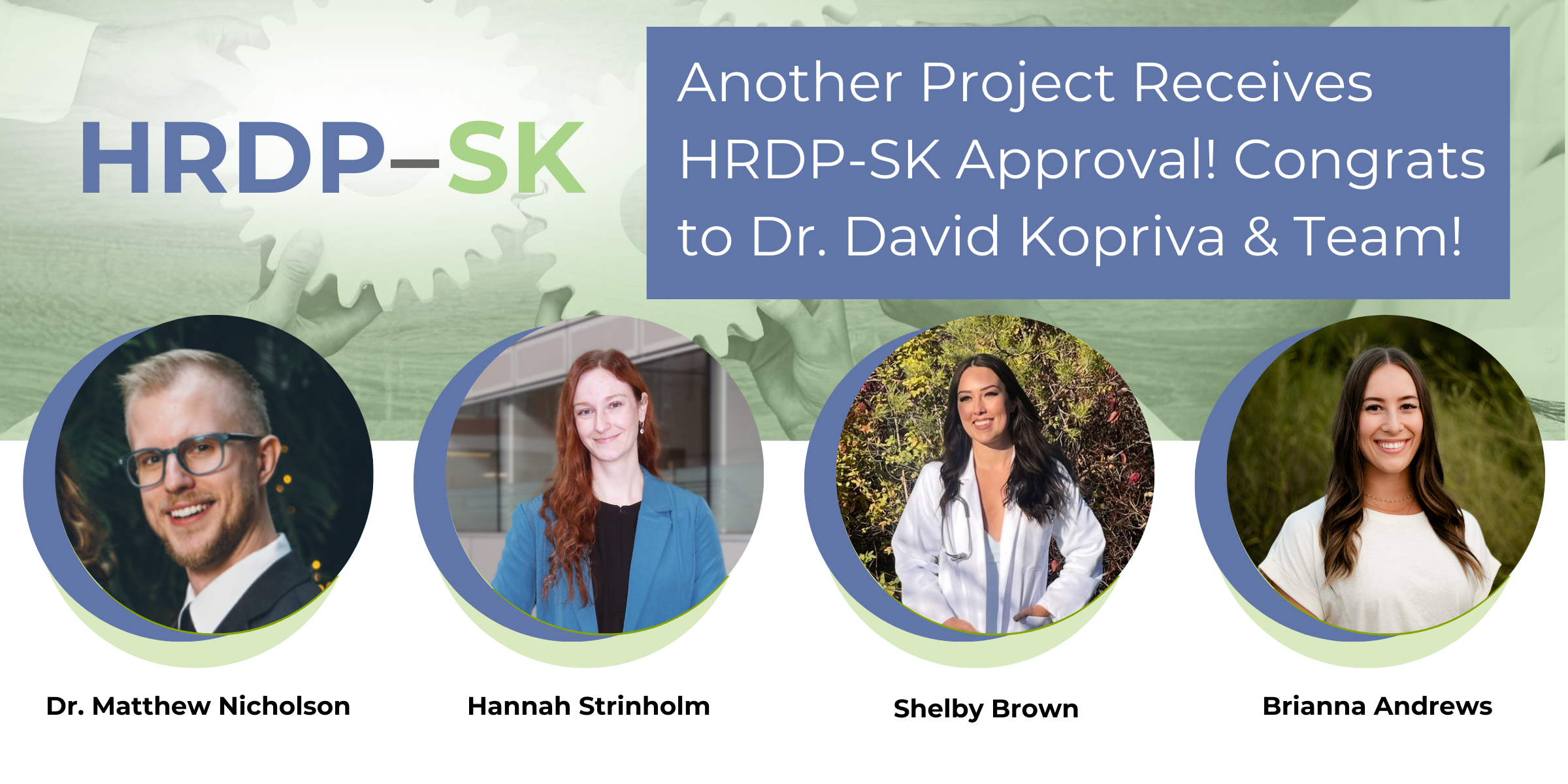
NEWS & UPDATES
SCPOR’s Top 25 of ‘25
Learn about some of the impact made over the past year through SCPOR’s Top 25 of ‘25! Click here to see the full report.
SCPOR Report: January Edition
It’s a new year and a time to reflect! Check out SCPOR’s Top 25 of ‘25 and see what still to come in the January 2026 SCPOR Report.
HRDP-SK data being used for another project!
On a smoky Saturday at kids’ soccer, three physician parents (emergency, radiology, surgery) discussed how it seemed they had been seeing more ER visits during heavy smoke days, not only for breathing issues, but also for abdominal inflammatory conditions like appendicitis, diverticulitis, and pancreatitis. They wondered if the pattern was real or just coincidence. Using HRDP-SK data from Saskatoon, Regina, and Prince Albert, the research team will compare visits during heavy smoke versus average air quality days. If the data show an association, this could help hospitals plan staffing and resources and guide management strategies.
A new team is accessing HRDP-SK Data!
Dr. David Kopriva’s research team will use the HRDP-SK to understand patterns of care and identify opportunities to improve care in Saskatchewan’s abdominal aortic aneurysm (AAA) surgical patients. An AAA is a bulge in the main vessel that takes blood from the heart to the rest of the body. AAA ruptures can be life-threatening; the largest are sometimes treated with surgery, which poses post-operative risks, including blood clots in veins. Using HRDP-SK clinical and administrative data, the researchers will be able to identify how common post-operative blood clotting is in the province and how patients could benefit from more preventative treatments.
SCPOR Report: December Edition
Enjoy some holiday reading and catch up on all things patient-oriented research! Read the December edition of the SCPOR rePORt!
Dr. Mamata Pandey has been approved to start research using HRDP-SK data!
Dr. Mamata Pandey who has been approved to start research on youth detox and addiction treatment in Saskatchewan using HRDP-SK data! This project will help drive evidence-driven improvements to detox and addictions treatment for youth in the province. The HRDP-SK research will be used as part of a Ministry of Health and Saskatchewan Health Authority program evaluation in order to address gaps and challenges in the delivery of youth substance use programming in the province.
SCPOR Report: November Edition
The November edition of SCPOR Report is filled with event and trainee opportunities along with highlights of HRDP-SK successes and more! Click here to check it out!
Fifteen Teams in the HRDP-SK
Fifteen research teams are now actively analyzing Saskatchewan population health data through the Health Research Data Platform – Saskatchewan (HRDP-SK). This marks a significant increase in researchers using real health system data to understand the health of Saskatchewan people and health services.
Two years ago, Saskatchewan data trustees did not have consistent or coordinated processes to provide data access to health researchers. This limited researchers' capacity to study everyday health interactions, often leading to stalled projects, smaller and less representative samples, and other roadblocks. Since its January 2024 launch, the HRDP-SK has offered a coordinated, privacy-protective request process for researchers to access Saskatchewan health system data. The HRDP-SK has changed the landscape of health research in the province, allowing researchers to access health data with fewer obstacles than ever before. Faster access to multiple linked data sources has created the potential for research results that can be implemented sooner, and lead to improved health outcomes.
The research community has responded with increased demand for data services in a variety of areas. Among the 15 research projects currently using the HRDP-SK are those investing in rural health and service delivery, including the Rural Dementia Action Research program; teams conducting program evaluations of innovative health delivery models, such as the USask Chronic Pain Clinic, which uses an interprofessional care model and both virtual and in-person consultations for increased accessibility; and researchers collaborating closely with service providers to enable rapid real-world application of research findings, like those used in Sanctum 1.5.
“Researchers want and need access to health data,” says HRPD-SK Director Malori Keller. “Now that we have effective processes in place, our goal is to expand research capacity by incorporating new datasets and providing access to more research teams.”
HRDP-SK has introduced analytic and research supports to help researchers and clinician scientists effectively use administrative health data; HRDP-SK research scientists and analysts help teams develop their research protocols, questions and data needs, then provide analyst support throughout the project. Expansion through a partnership with the Clinical Research Support Unit at the University of Saskatchewan has helped address the increasing demand for analysts with experience using Saskatchewan health data.
Enhanced research capacity extends past provincial borders, as well; three projects are currently harnessing data from multiple provinces across Canada through HRDP-SK’s collaboration with the Health Data Research Network Canada. As other national studies begin integrating Saskatchewan data, it will mark a positive shift in evidence driven healthcare and help ensure Saskatchewan’s unique strengths and challenges are reflected in national policy.
“In order to make timely, evidence-based health and policy decisions, we need accessible, good source data. In Saskatchewan, we are fortunate to have access to so many good sources of health data in a secure and safe environment that protects patients’ privacy,” says Lisa Dietrich, Director, Health Information and Privacy, Saskatchewan Ministry of Health. “Continued and expanded access to Saskatchewan data is essential. We’re excited to see HRDP-SK taking us there.”
SCPOR Report: October Edition
Cool opportunities in this month’s edition of the SCPOR Report! Click here to learn more
SCPOR Report - September Edition
September brings us back to school and back to the books! Keep up to date by reading the September Edition of SCPOR Report!
Dr. King and her team are accessing data in the HRDP-SK!
The Virtual Cascade of Care Cohort (VCCC) is a pan-Canadian ‘virtual cohort’ study to document and analyze the hepatitis C virus (HCV) cascade of care in diverse groups of people with current or past injection drug use experience. Led by Dr. Alexandra King, the Saskatchewan component places a particular emphasis on engaging with Indigenous participants and will combine in-person questionnaires and HCV screening tests with health data, covering a five-year window. The VCCC study aims to map the full continuum of HCV care while identifying key characteristics that are presented as barriers and facilitators to care in this population. In addition, the study will explore how determinants of health, including inadequate housing, involvement with the correctional system and substance use, impact access to care.
The VCCC study will also examine health care utilization patterns, long-term health outcomes and the costs associated with HCV care in this population. The findings will guide public health strategies, inform simulation models for policy planning and support Canada's goal of eliminating HCV as a public health threat by 2030.
SCPOR Report: August Edition
Join us as we head back to school and close off summer with the August edition of SCPOR Report.
Dr. Mary Ellen Labreque and her team are set to begin using HRDP-SK data!
Another exciting project is accessing health data in the HRDP-SK! Dr. Mary Ellen Labreque and her team will begin using HRDP-SK data to highlight services provided by Saskatchewan Nurse Practitioners (NP) over the past 10 years, an area into which there has been no formal inquiry to date. Her team’s research will inform discussions with Saskatchewan’s NP education programs on what health concerns are commonly addressed by Saskatchewan NPs and how this information aligns with the current content of NP education in the province. Findings from this research will lead to continuing education, quality improvement and innovations to support recruitment and retention to stabilize rural resident access to primary care services. Additionally, findings will inform policy changes surrounding alternate NP funding models and priority areas for recruitment of NP clinical services.
SCPOR Report: July 2025
Take a break from the summer heat and dive into the July edition of the SCPOR Report!
Dr. Jyoptal Singh is beginning research in the HRDP-SK!
Chronic obstructive pulmonary disease (COPD) is a disease caused by damage to the lungs, and Singh's team aims to understand how access to early spirometry testing, such as in the Regina COPD Pathway, can impact COPD patient outcomes.
Results from this work will contribute key data and evidence to help support the creation of a provincial COPD pathway.
Dr. Liran Levin's project has been approved to start research in the HRDP-SK!
Dr. Liran Levin's research studying head and neck injuries resulting from domestic violence has been approved to start research in the HRDP-SK! Dr. Levin and collaborators will use historical healthcare records in Saskatchewan to understand how often head and neck injuries result from domestic violence.
The researchers hope to improve how medical professionals identify these injuries, to support better care with quicker intervention and fewer complications for patients. This is also the first phase of an overarching study that aims to create clear guidelines to help dental professionals identify, document, approach, and respond to domestic violence.
SCPOR Report June 2025
An update on the patient-oriented research and related topics and events taking place in Saskatchewan and around the country … check it out here!
Dr. Donkers and her team can now access SK Health Data
Every new project accessing data in the HRDP-SK is a win for Saskatchewan health research. Dr. Sarah Donkers will use HRDP-SK data to help determine the rehabilitation services available to people with neurological disorders across Saskatchewan. Limited access to neurorehabilitation services outside of Saskatoon and Regina lead to longer hospital stays or inadequate home support for many of those affected. By accessing Saskatchewan-specific data, Dr. Donkers and her team will assess current services, identify ways to enhance capacity and support best-practice implementation with the goal of improving equitable access to neurorehabilitation and enhancing patient outcomes and healthcare efficiency.
Another Project Receives HRDP-SK Approval!
Dr. Brown, Dr. Guttman, Dr. Camden and their team, in collaboration with community based advisory groups, are seeking to develop a national surveillance system to monitor perinatal opioid use and investigate their impact on maternal and child health in Canada. Access to the HRDP-SK through Health Data Research Network – Canada’s Data Access Support Hub will ensure Saskatchewan data is represented. Findings from their study will be used to better understand the needs of people who use opioids in pregnancy and children with prenatal opioid exposure and improve the care they receive.
Another Project Receives HRDP-SK Approval
Saskatchewan pharmacists provide clinical services, such as prescribing for minor ailments and conducting medication reviews. By using HRDP-SK data, Dr. Mansell and his team will examine the uptake and delivery patterns of these services with the goal of gaining a deeper understanding of the evolving role of pharmacists in Saskatchewan and country wide.





















